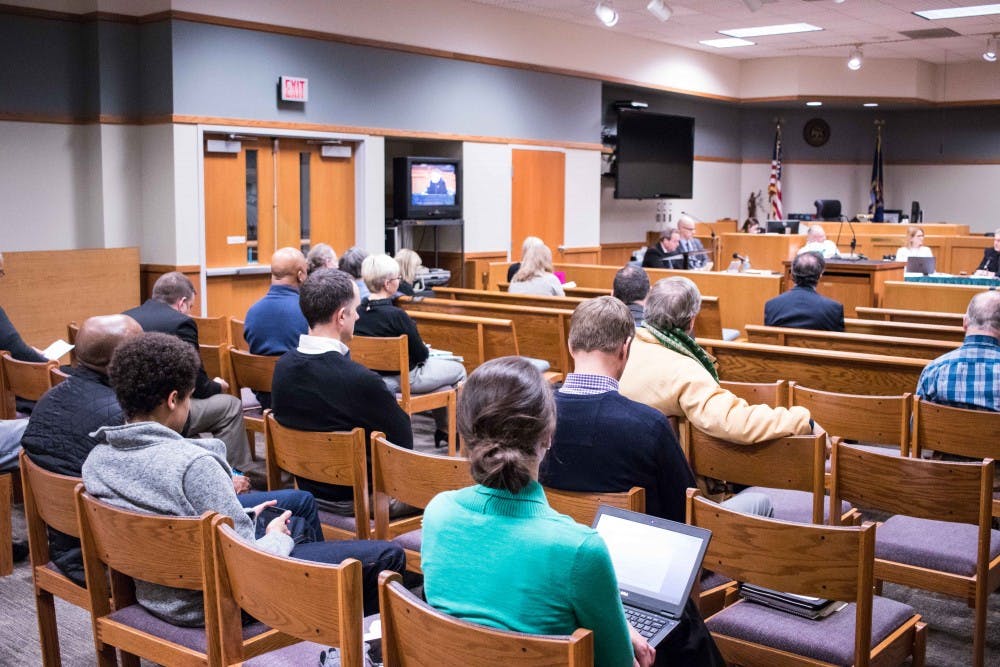Five revenue options were approved for public hearing at Tuesday night's city council meeting, offering some hope the city's current financial pressure can be resolved with fewer cuts to city services.
These options come as the city faces financial uncertainty, driven in large part by "legacy costs" like employee pensions. Recent council meetings have focused more on the cuts needed to balance the budget.
One option is essentially a remodeled version of the income tax residents voted down in November 2017. Unlike the previous iteration, this tax would expire and be put to a vote for renewal in 15 years. Every year, the first $5 million raised by this tax would be dedicated to paying off the city's unfunded pension liabilities.
The second revenue option was a proposed "Headlee override," where voters would have to approve increasing the city's millage rate. Growth in property values forced the city to roll back the tax rate by 2.4321 mills under an amendment to the state constitution, while the override would restore the millage back to 20, City Manager George Lahanas said.
The resolution proposed that 1.4321 of the restored mills be dedicated to parks and recreation, while 1 mill would be dedicated to infrastructure improvements.
In addition to these possibilities, the city will also hold hearings on a public safety pension board, as well as two resolutions authorizing the issuance of bonds to finance parks and street repairs.
The creation of a pension board would allow council to levy additional mills solely dedicated to funding public safety pensions. The city anticipates such a move could bring in $2.9 million annually in additional revenue.
The public hearings for these options were set for Feb. 27. Originally, the hearings were proposed for Jan. 30, but councilmembers chose to push the date back to better analyze public opinion on the benefits of making cuts versus creating revenue.
"If we're going to go to the voters again, don't just give them an option for revenue, give them the alternative," councilmember Aaron Stephens said. "Then, not only is the community making a decision based on those two options, but they know what's going to happen right after."
Mayor Pro Tem Erik Altmann said there would be no "silver bullet" in solving this problem, in that the city's financial troubles went far beyond making easy cuts or stumbling into new revenue.
"I frankly don't expect to have a whole lot of low-hanging fruit," Altmann said. "When you come at this process, before you've really grappled with all the details, it's easy to think that there's got to be something in there that you can pick off that will really help solve your problems. I don't expect that that's going to be there."
Lahanas has previously said the city should, at minimum, be freeing up $3 million per year to catch up on pension payments. This means the pension board and Headlee override options — if approved — would almost certainly have to be combined with cutbacks.
Altmann and Stephens, an MSU student, mentioned the possibility of re-opening talks with the university about contributions to the city's general fund in lieu of a city income tax. East Lansing and MSU previously failed to come to an agreement on the matter.
Before the public hearings, council will review a report from Public Sector Consultants analyzing survey results from two recent public budget discussions. The city held sessions on Jan. 10 and Jan. 18 in an attempt to gauge residents' reactions to proposed cuts and revenue streams. Nearly 200 people attended the meetings, according to Altmann.
Meadows said he expected the high turnout to the public budget discussions to be a good indicator that the public hearings would be similarly well-attended.
"Because of the attendance at the two community meetings that we had, I believe that at our council meeting on Feb. 27, we will get a room full of people that will want to talk to us about potential revenue," Meadows said.
Support student media!
Please consider donating to The State News and help fund the future of journalism.
Discussion
Share and discuss “City council discusses revenue options amid budget crisis” on social media.







